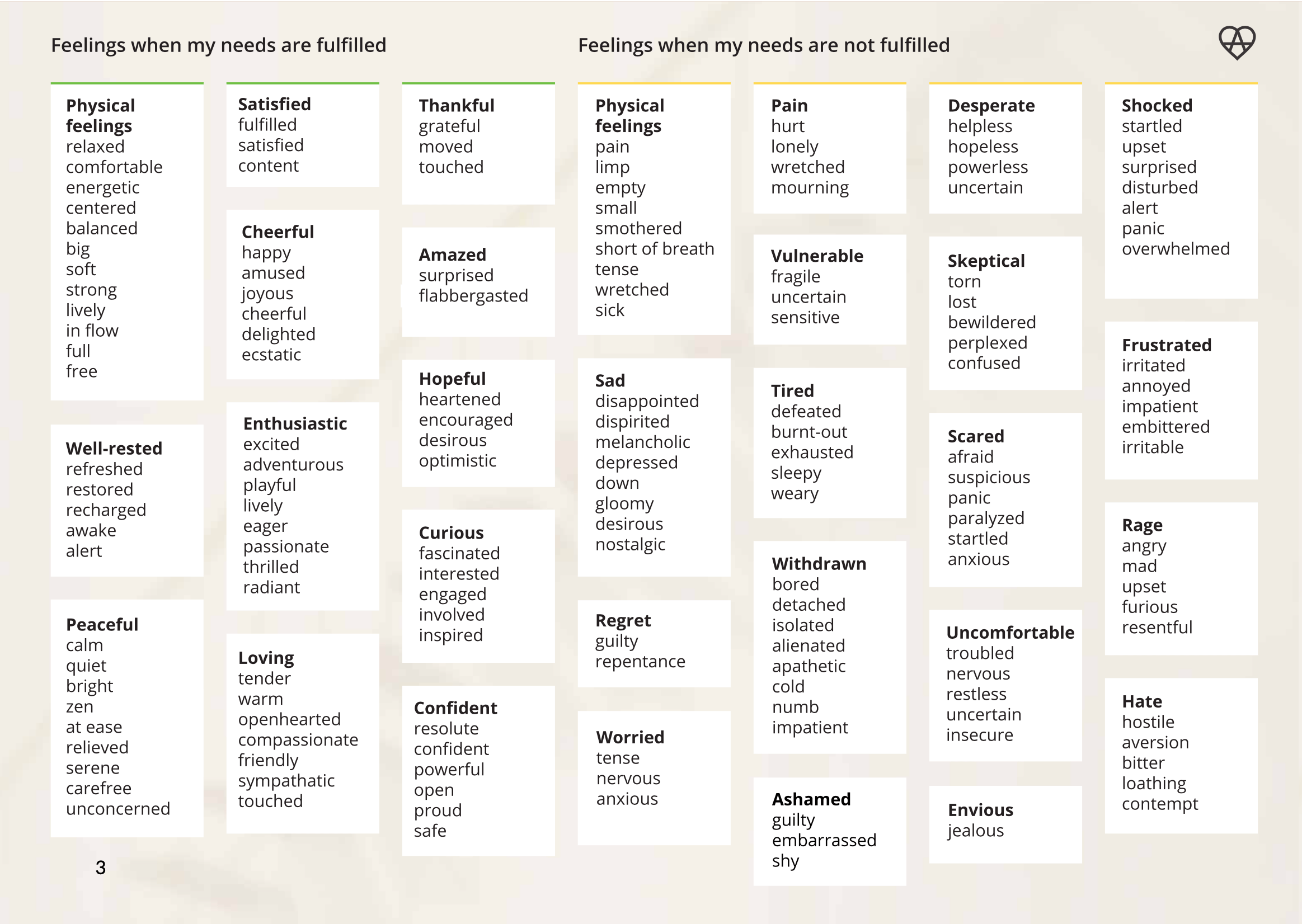NVC Workshop #2: Identifying feelings when speaking and listening

Welcome to this second workshop on NVC! In the first workshop we looked at the first step in Non Violent Communication, Observation. I know a few of you have tried the exercise out and I have heard some very positive feedback from your experiences. Now we understand the basics of how to listen, we will now focus on understanding how to deal with feelings, especially when they involve either blaming or being blamed. It is important to note that each step in the NVC process is explained and applied to both listening and speaking, and so this workshop will be divided into both sections. One of the most important aspects of being able to identify feelings is to practice and learn how to bypass blame and judgement and focus on feelings instead. This mean taking responsibility for our feelings and being able to simply state our needs, with a specific request made to do it. This can be hard for a few reasons, and very often we are not even aware that we are blaming another or judging them whilst we tell them how we feel.
In NVC there are certain phrases that we do not use, pretty much ever. At first it may seem difficult or even impossible to share a feeling without saying a sentence that begins with:
" I feel angry because you ... "
or
"I m upset and want you to stop doing.... "
Other examples of sentences that sounds like feelings but are actually judgements are:
I feel like you are ignoring me.
I feel you are spending too much time at work.
I feel disrespected.
I feel judged.
Notice that many of these statements start out either, "I feel like?", or "I feel you." Whenever you catch yourself starting a sentence in this way, be aware that you are probably about to state a thought instead of a feeling!
What we have to understand in NVC is that sentences that begin like that almost never get a positive outcome and serve no useful purpose. As Marshal Rosenberg says "Blame and judgement are tragic expressions of our unfulfilled needs. " Unless we are familiar with NVC it can be hard to know what to say instead, how to phrase things so that you can say something more effective and that really deals with the specific root issue at hand. Most arguments end up being an almost endless rally of blaming and defending ourselves. Defending ourselves usually means dragging up every other issues that has upset you, so that we also end up arguing about 100 different things without ever really getting to the root of the problem.
We are learning how identifying our feelings this week because it is a critical step in being able to then discover the needs that are not being fulfilled and lie behind these feelings. Once we know the feelings and needs of ourselves or another person we are then ready to express it in a clear and useful way. This usually paves the way for people to find a way to meet at least some of their needs.
So we will start by practicing hearing feelings with a few exercises first relating to listening with NVC. This exercise is so important, and after you have read and answers a few simple example questions you will be ready to practice it with others when they speak to you. To help you with this you can use the image and PDF below that contains a list of feelings.
Exercise 1: Listening with Giraffe Ears: Feelings
Imagine you are with with your partner / friend / child and they are upset about something. After you notice they have been moping around for some time you decide to ask them if they are OK. They look up at you with angry eyes and tell you that they are quite upset with you. This surprises you as you can't think of anything you have done that could have upset them, and so you ask them to share more about it with you. Both of you sit down, and they start to speak.
In this exercise you will be presented with several statements that your imaginary partner makes during this sharing. Many of them may be framed in a blaming or judgemental way. What you have to do is to choose whether you think they are expressing a feeling or a thought. This exercise is very helpful to help us listen with giraffe ears and to know whether you are really hearing the feeling that you are trying to identify.
QUESTIONS
Are the following statements a thought or a feeling? Answers are below with some explanation.
1. I feel like you don't respect our work.
2. When you ran into the street without looking, I felt scared.
3. When you mentioned that your boss is out to get you I felt worried.
4. I feel ignored.
5. I feel frustrated when I see you come to work 30 minutes late three times this week.
GAP BEFORE ANSWERS
ANSWERS
1. The correct answer is Thought.. . Clearly, the speaker is expressing a thought that the other person doesn't respect their work. If she was expressing a feeling, she might say, "When you don't complete your projects (observation), I feel disappointed (feeling)." It is not a feeling because the speaker is actually expressing her thought that the other person doesn't respect their work. She doesn't express how she feels about this, such as hurt, angry, sad, disappointed. When we use thoughts instead of feelings, it often stimulates pain in other people and creates an even more emotionally charged situation.
2. The correct answer is Feeling. The speaker is clearly stating that she felt scared when her child ran into the street without looking. A thought might have been, "When you ran into the street without looking I felt like you didn't care about safety." It is not thought because in this example, the speaker clearly states their feelings. If they were expressing a thought, it might have sounded like this, "When you ran into the street without looking I felt like you didn't care about safety."
3. The correct answer is Feeling. The speaker expresses her worry about the other person's statement. A thought might be, "Your boss sounds like a jerk." It is not thought because the first part of the sentence (When you mentioned that your boss is out to get you) sounds like a thought, but it is actually an observation because the speaker is repeating what the other person said. Then, he states how he feels about it.
4. The correct answer is Thought. The speaker is telling the other person that she thinks he was ignoring her, but she didn't clarify her feelings. A way to say this that would clarify feelings could be, "When you don't respond to my question (observation) I feel annoyed (or angry)." It is not feeling because this is one of those situations where the words used "I feel ignored" have emotional charge but they do not clarify the speaker's feelings. Another way to say this that would clarify feelings could be, "When you don't respond to my question (observation) I feel annoyed (or angry)."
5. The correct answer is Feeling. The speaker is expressing her frustration. A thought might have been, "I feel that you don't respect your team when you show up 30 minutes late three times this week." The answer is not thought because the speaker is clarifying how she feels about the situation. If he were expressing a thought it might have sounded like this, "I feel that you don't respect your team when you show up 30 minutes late three times this week."
Responding to identify feelings
In a real life situation we would respond to either clarify the feeling if their statement was a thought, or mirror and repeat the feeling back to them so they know you heard them. It would sound something like:
PERSON SAYS: "I feel like you don't respect our work."
Since this is a thought and not a feeling you will respond only to try to identify or understand the feeling that they are experiencing. Most importantly, when we are listening and thinking like this, we do not even hear or care about and potential or direct blame or criticism in the statement, and likewise we are also not interested in trying to defend ourselves. Since we are focused on helping them identify the feeling you might ask one of the following:
"Can i ask what gives your that impression, and does that make you feel upset/invalidated/angry etc etc? "
They will usually agree if you do get the right feeling, and it will be clear you have got the right feeling when they have a strong reaction or sigh.
You could also take this opportunity to reassure them that you do (if you do) respect their work by saying something like:
" I very much respect your work and find it a great source of inspiration for many of our projects"
So in this exercise you can now go through the remaining 4 questions and write a response to them.
Remember, NVC is so powerful because it gives you a way to hear what people are really trying to tell you, rather than what they are actually saying. This exercise will help you to familiarise yourself with this kind of listening so that you can do the same in real life.. its not as hard as you may think to totally change the dynamics of our conversations and conflicts. You can start by watching this short video to help explain this and then write your answers.
FEELINGS vs. THOUGHTS | Marshall Rosenberg
Thinking vs Feeling; Needs vs Strategies; Request vs Demands
Exercise 2: Speaking with a giraffe tongue
If we are speaking or sharing rather than listening as in Exercise 1 then we need to learn how to speak and share our feelings and needs without blame or judgement. In order to do this we need to understand our feelings and what needs they are associated with. We will cover this is more detail in the next exercises. For now we need to learn how to identify and express our feelings without yet being concerned with the need. In this exercise please write 5 sentences as you have seen above that state how you feel about something that is in some way upsetting you.
Please watch this video to help you learn more before you begin, and don't forget to refer to the image below when you are writing your sentences.
NVC PSEUDO FEELINGS: ARE YOU USING THEM?
Feelings Reference

When you have completed both exercises please share it with us either in the comment of this post or as a post itself If you have any questions about any of this please do ask and I will help you.
That is the end of this second workshop. Once you have done this is is a great idea to keep practicing, either by yourself or with a friend. You could even make it a role play with a good friend who can pretend to be shouting at you about something or other, and you just keep helping them identify their feelings (and needs). This is a fantastic and quite fun way to learn this, something akin to practicing flying an aeroplane in a flight simulator.
Thank you for being a part of this, please do re-steem if you understand and value the importance of NVC in our lives.


The 8 Pillars of @TribeSteemUp
@ecoTrain
Supporting People Who Help
Make The World A Better Place

Discover previous ecoTrain magazines at @ecoTrain
** Click Here To View Our Feed **
To listen to the audio version of this article click on the play image.

Brought to you by @tts. If you find it useful please consider upvoting this reply.
Yes in "end effect" it would be that the magic us in controlling the *emotional enviornment", while "not" appearing to do so!
👍🏼😉👍🏼
I practice this as often as I can,
"keeps diwn the chaos"! 😉😁😉
"Guilt and judgment are tragic expressions of our unmet needs." This is a great quote, in fact it is incalculable how many people move within this sphere that only contains the frustration and pain of feeling that it is not enough for certain things and projects its own dissatisfactions onto others.
It is quite interesting the approach of giving way to feeling rather than thinking when establishing healing dialogues in close relationships, because many times the root of problems between family and friends are misinterpretations due to the use of expressions that privilege judgment or guilt instead of feeling, even if we do it without realizing it.
This second workshop gives us the opportunity to rethink the way we are communicating and to value the true feeling that really moves a conversation if we practice and consciously apply the power of NVC.
Thank you, my dear @eco-alex, for bringing us these pearls of wisdom. The workshop is quite digestible and focuses on detailing why sometimes we do not communicate successfully and are misunderstood.
A big hug!
I would be happy if someone would say >" I feel angry because you ... "
or
"I m upset and want you to stop doing.... "
At least you say it is your feeling that... It is better as ignoring or treating someone from one day to the other like a piece of shit.
My children never looked with angry eyes at me neither did my friends and I have no partner.
Communication and knowing each other is the key but the way we communicate depends on our gender and culture too.
With some people you can never talk. They always feel insulted and each word will be seen as a personal attack.
Feelings are hard to express and it's even harder to feel what someone else feels simply because you are not that person.
Good luck with the workshop.
!trdo 💕
Posted using Partiko Android
Congratulations @wakeupkitty, you successfuly trended the post shared by @eco-alex!
@eco-alex will receive 0.36960300 TRDO & @wakeupkitty will get 0.24640200 TRDO curation in 3 Days from Post Created Date!
"Call TRDO, Your Comment Worth Something!"
To view or trade TRDO go to steem-engine.com
Join TRDO Discord Channel or Join TRDO Web Site
Thank you for telling me @trendotoken
Congratulations @eco-alex, your post successfully recieved 0.369603 TRDO from below listed TRENDO callers:
To view or trade TRDO go to steem-engine.com
Join TRDO Discord Channel or Join TRDO Web Site
Powerful session!
I know expressing my emotions and even really connecting with my emotions and feelings has been a weak point for me.
I really resonated with the second video where Yvette spoke how often in our society we either ramp up our emotions to get our needs filled or we take the stance that our emotions or feelings are not important and we just push them aside - the later is me to a tee!
Even when I look at the list of feeling words there are not many that I use in my communications.
Thank-you for hosting this non-violent communication workshop bringing growth to me in an area I have been neglecting!